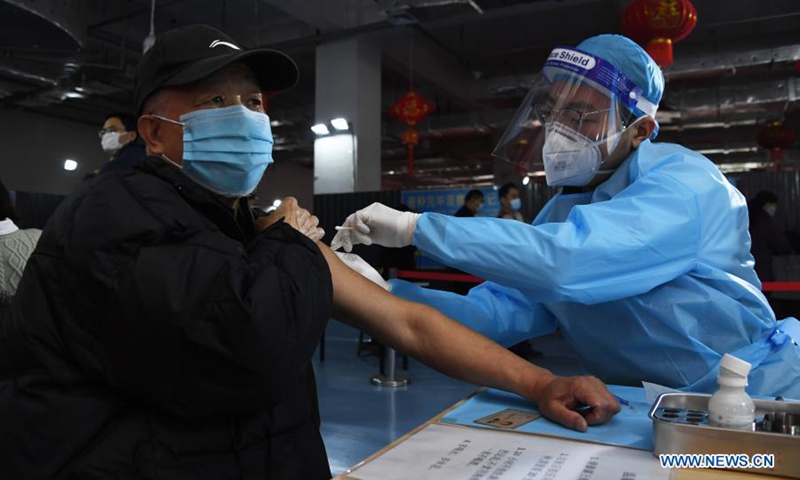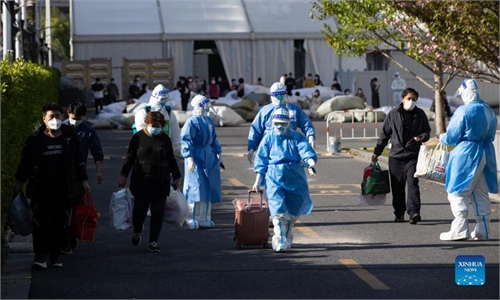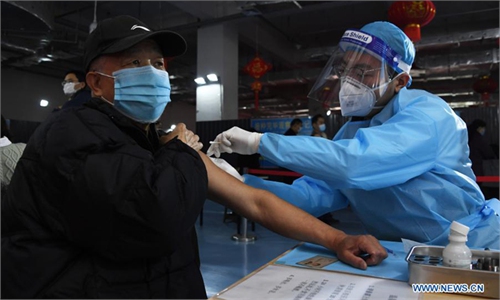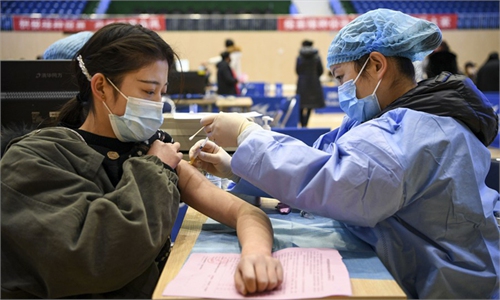
A resident is inoculated at a vaccination site at Yongdinglu Sub-district of Haidian District in Beijing, China, March 14, 2021. Yongdinglu Sub-district has started to inoculate residents aged over 60 with COVID-19 vaccines. Green channels have been set up at the vaccination site and staff will help the elderly to reserve on site and provide related consultation.(Photo: Xinhua)
Ten deaths of COVID-19 patients in Shanghai in the past two days are sounding alarms in the city, which has a relatively low vaccination rates among provincial-level regions in the Chinese mainland. For the country at large, it is also a strong reminder that the insufficient vaccination rate among the elderly is a towering obstacle to China's move to ease COVID-19 restrictions, said epidemiologists.
Shanghai reported seven new deaths on Tuesday, aged 60 to 101 years old. Those deceased were all unvaccinated, and the direct causes of death were their underlying conditions, Wu Qianyu, an official from Shanghai's health authority said in a Tuesday briefing.
Those new deaths took the city's total toll to 10 during this outbreak, with more than 300,000 infections since March.
Although the number of patients released from the makeshift hospital surpassed that of the new daily tally, epidemiologists said that the deaths reported in the past two days in Shanghai highlighted the lurking danger, given the city's low vaccination rate of its senior residents.
On Friday, Shanghai government officials said that only 62 percent of the city's 3.6 million elderly - aged 60 and above - are fully vaccinated, and the rate among those aged above 80 years old is only 15 percent. The rate of those getting booster shots accounts for merely 38 percent.
In comparison, 80 percent of those aged above 60 in Beijing have been fully vaccinated. The vaccination level of 60-plus residents of Jiangxi, Anhui and Shandong has surpassed 90 percent. Seven other provincial-level regions, including Chongqing, Henan and Hubei, have rates as high as 85 percent, officials from the National Health Commission revealed in late March.
Nationwide, the rate of fully vaccinated people aged above 60 amounts to 79 percent.
The insufficient vaccination rate among China's elderly in some areas is because this vulnerable group has been well protected by the low infection in China during the past two years, so "they did not feel the urgency of getting vaccinated," Zeng Guang, former chief epidemiologist of the Chinese Center for Disease Control and Prevention (CDC), told the Global Times.
Due to its previous precise management mode, Shanghai remained unscathed by COVID-19 during the past two years.
Fears of side effects among the elderly group are more widely shared in developed regions where people have wider access to information, Zhuang Shilihe, a Guangzhou-based medical expert, also told the Global Times.
Wang Huaqing, chief immunologist at the CDC, told a conference in late March that the chance of someone aged above 60 suffering an adverse reaction to a COVID-19 vaccine is lower than for other age groups.
Hong Kong faces the same dilemma, with only about one-third of those aged over 80 being fully vaccinated. So the city reported a high mortality rate due to the Omicron onslaught, and 90 percent of the deaths involved people who were not fully vaccinated.
Epidemiologists said boosting inoculation rates among the elderly is one of the most urgent issues for China's opening up. Zhuang suggested the government can roll out campaigns to ease fear of the vaccines, and offer incentives to get the shots. Some supermarkets in Beijing are giving out free food, vegetables and coupons to people aged 60 and above if they are vaccinated. Some places such as Guangzhou use home visits to help senior people get vaccinated.




